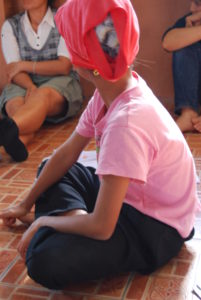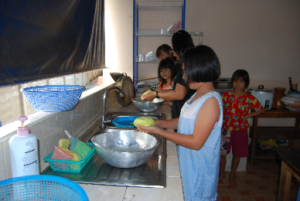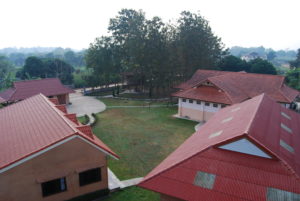In 1990 Christine Overeem(founder) opened the first house of Baan Phak Phing. She said,” in 1985 when my former employer and his wife wanted to go back to Thailand, where they had previously worked, they asked me if I wanted to go with them. I decided to go. During the trip through Thailand I saw many things, but one thing stayed with me… While someone from Bangkok was talking with my former employer, I overheard one sentence, ‘I am going to open a house for children who have been in prostitution, because there is a big need in that area.’ That sentence got stuck in my head, and I couldn’t get it out.”
The First House of Refuge

When Christine came back to the Netherlands it still wasn’t clear what she was supposed to do with that experience. This went on until someone sent her an article about a burned down brothel in Thailand. In the picture you could see dead children chained to their beds. That article made an indelible impression on her. She decided that she wanted to work in Thailand. Two years later she left for Thailand. She learned the language, which is a really hard one, so that she could do her work effectively. She built up a network and started gathering information. It was clear for her that she couldn’t do this work alone, she had to find someone who could help her. She found that help in Heidi Rau. Heidi was working with refugees in an area bordering Cambodia. Together they started, in Bangkok, to work on a task which, up till then, nobody had done.
In that time period people started writing newspaper articles about child prostitution in Thailand. The Thai authorities reacted by sending raiding parties to the brothels. The girls who were rescued needed immediate care. Christine and Heidi were prepared for this. They had already rented one house, the necessary help was available and a Thai person was added to the team. For these girls the primary necessity was a safe haven and because they were sold by their parents going home was not an option. Christine and Heidi offered them a house of refuge. To get the girls closer to their families and away from the busy and dangerous city of Bangkok, Christine moved her ministry up north.
Northern Thailand
Up north there was also a lot of work

to do. If the girls there weren’t in a brothel, they were used in other ways. There are families who let their neighbors “borrow” their daughters. In return for sex the girls got money which went directly to their family. When the girls tell their story at, for example, school or, in case of sickness, go to the hospital, they can be redirected to Baan Phak Phing. If the perpetrator hasn’t fled then the father or whoever it is can be put behind bars. If the culprit is the provider of a family then that family will have financial problems. At the same time the girl doesn’t bring in any more money. That is why mothers often resent their daughters for spilling the beans. This makes it hard for us to send those girls home again and so we try to contact other family members. It became clear to Christine that girls who have been abused in their childhood often end up in prostitution, without any hope of ever coming out. These girls’ lives have been destroyed by others at a very young age. The main incentive for Christine and her team is to help these girls before they hit adulthood.
Four Houses of Refuge

Christine Overeem has been working in Thailand for 25+ years. In the meantime she has opened four houses at Baan Phak Phing. She has been doing this work all along without any personal income and she is totally dependent on donations. Luckily this has gone well all these years. Sefanja, a church in Harderwijk(in The Netherlands), has been sponsoring her for years. So have many private sponsors from The Netherlands and from other countries as well. In gratitude she looks back on the fact that she and the girls lacked nothing. There was always food, a roof over their heads, salaries for the staff, and clothing and education for the girls.
In those years well educated and motivated Thai staff members were recruited. In 2007 Peter and Tatjana with their 3 sons, a Dutch family, went to live Thailand. Peter is responsible for all the maintenance work at Baan Phak Phing, he is a concierge, mechanic, and IT administrator. He ensures, in the broadest sense of the word, the maintenance of the four houses at Baan Phak Phing. Tatjana does, besides her personal responsibilities, various things for Baan Phak Phing, such as projects, the website, and communications with The Netherlands and the rest of the world.
The Future
In 2011 Christine handed over the responsibility of the day-to-day leadership of the houses to three of our Thai staff. Christine will be available for them as an advisor. She will also keep up the (inter)national contacts and she has fully put herself to the task of coaching/counseling the girls. Her main goal is to make sure that Baan Phak Phing will be able to function independently for many decades to come. This ministry’s work isn’t done yet, not for a long time. It is more than worth it to see a girl come in and then later be able to, with love and care, make a new/fresh start in life. Sadly the current recession is also felt here in Thailand. The houses at Baan Phak Phing can take resources from their own vegetable garden and fishpond and they use resources sparingly. Financial resources remain a concern as there are approximately 30 girls living at Baan Phak Phing.
Stichting Baan Phak Phing was created to provide more financial certainty. Their goal is to promote and support the work in Thailand. The foundation keeps itself busy with organizing open houses and fundraising so that Baan Phak Phing can keep offering girls a future with perspective.
 When Christine came back to the Netherlands it still wasn’t clear what she was supposed to do with that experience. This went on until someone sent her an article about a burned down brothel in Thailand. In the picture you could see dead children chained to their beds. That article made an indelible impression on her. She decided that she wanted to work in Thailand. Two years later she left for Thailand. She learned the language, which is a really hard one, so that she could do her work effectively. She built up a network and started gathering information. It was clear for her that she couldn’t do this work alone, she had to find someone who could help her. She found that help in Heidi Rau. Heidi was working with refugees in an area bordering Cambodia. Together they started, in Bangkok, to work on a task which, up till then, nobody had done.
In that time period people started writing newspaper articles about child prostitution in Thailand. The Thai authorities reacted by sending raiding parties to the brothels. The girls who were rescued needed immediate care. Christine and Heidi were prepared for this. They had already rented one house, the necessary help was available and a Thai person was added to the team. For these girls the primary necessity was a safe haven and because they were sold by their parents going home was not an option. Christine and Heidi offered them a house of refuge. To get the girls closer to their families and away from the busy and dangerous city of Bangkok, Christine moved her ministry up north.
When Christine came back to the Netherlands it still wasn’t clear what she was supposed to do with that experience. This went on until someone sent her an article about a burned down brothel in Thailand. In the picture you could see dead children chained to their beds. That article made an indelible impression on her. She decided that she wanted to work in Thailand. Two years later she left for Thailand. She learned the language, which is a really hard one, so that she could do her work effectively. She built up a network and started gathering information. It was clear for her that she couldn’t do this work alone, she had to find someone who could help her. She found that help in Heidi Rau. Heidi was working with refugees in an area bordering Cambodia. Together they started, in Bangkok, to work on a task which, up till then, nobody had done.
In that time period people started writing newspaper articles about child prostitution in Thailand. The Thai authorities reacted by sending raiding parties to the brothels. The girls who were rescued needed immediate care. Christine and Heidi were prepared for this. They had already rented one house, the necessary help was available and a Thai person was added to the team. For these girls the primary necessity was a safe haven and because they were sold by their parents going home was not an option. Christine and Heidi offered them a house of refuge. To get the girls closer to their families and away from the busy and dangerous city of Bangkok, Christine moved her ministry up north.
 to do. If the girls there weren’t in a brothel, they were used in other ways. There are families who let their neighbors “borrow” their daughters. In return for sex the girls got money which went directly to their family. When the girls tell their story at, for example, school or, in case of sickness, go to the hospital, they can be redirected to Baan Phak Phing. If the perpetrator hasn’t fled then the father or whoever it is can be put behind bars. If the culprit is the provider of a family then that family will have financial problems. At the same time the girl doesn’t bring in any more money. That is why mothers often resent their daughters for spilling the beans. This makes it hard for us to send those girls home again and so we try to contact other family members. It became clear to Christine that girls who have been abused in their childhood often end up in prostitution, without any hope of ever coming out. These girls’ lives have been destroyed by others at a very young age. The main incentive for Christine and her team is to help these girls before they hit adulthood.
to do. If the girls there weren’t in a brothel, they were used in other ways. There are families who let their neighbors “borrow” their daughters. In return for sex the girls got money which went directly to their family. When the girls tell their story at, for example, school or, in case of sickness, go to the hospital, they can be redirected to Baan Phak Phing. If the perpetrator hasn’t fled then the father or whoever it is can be put behind bars. If the culprit is the provider of a family then that family will have financial problems. At the same time the girl doesn’t bring in any more money. That is why mothers often resent their daughters for spilling the beans. This makes it hard for us to send those girls home again and so we try to contact other family members. It became clear to Christine that girls who have been abused in their childhood often end up in prostitution, without any hope of ever coming out. These girls’ lives have been destroyed by others at a very young age. The main incentive for Christine and her team is to help these girls before they hit adulthood.
 Christine Overeem has been working in Thailand for 25+ years. In the meantime she has opened four houses at Baan Phak Phing. She has been doing this work all along without any personal income and she is totally dependent on donations. Luckily this has gone well all these years. Sefanja, a church in Harderwijk(in The Netherlands), has been sponsoring her for years. So have many private sponsors from The Netherlands and from other countries as well. In gratitude she looks back on the fact that she and the girls lacked nothing. There was always food, a roof over their heads, salaries for the staff, and clothing and education for the girls.
In those years well educated and motivated Thai staff members were recruited. In 2007 Peter and Tatjana with their 3 sons, a Dutch family, went to live Thailand. Peter is responsible for all the maintenance work at Baan Phak Phing, he is a concierge, mechanic, and IT administrator. He ensures, in the broadest sense of the word, the maintenance of the four houses at Baan Phak Phing. Tatjana does, besides her personal responsibilities, various things for Baan Phak Phing, such as projects, the website, and communications with The Netherlands and the rest of the world.
Christine Overeem has been working in Thailand for 25+ years. In the meantime she has opened four houses at Baan Phak Phing. She has been doing this work all along without any personal income and she is totally dependent on donations. Luckily this has gone well all these years. Sefanja, a church in Harderwijk(in The Netherlands), has been sponsoring her for years. So have many private sponsors from The Netherlands and from other countries as well. In gratitude she looks back on the fact that she and the girls lacked nothing. There was always food, a roof over their heads, salaries for the staff, and clothing and education for the girls.
In those years well educated and motivated Thai staff members were recruited. In 2007 Peter and Tatjana with their 3 sons, a Dutch family, went to live Thailand. Peter is responsible for all the maintenance work at Baan Phak Phing, he is a concierge, mechanic, and IT administrator. He ensures, in the broadest sense of the word, the maintenance of the four houses at Baan Phak Phing. Tatjana does, besides her personal responsibilities, various things for Baan Phak Phing, such as projects, the website, and communications with The Netherlands and the rest of the world.